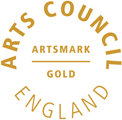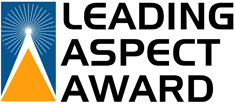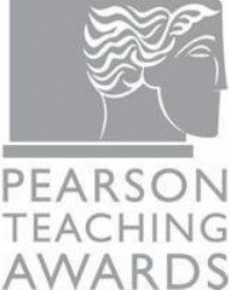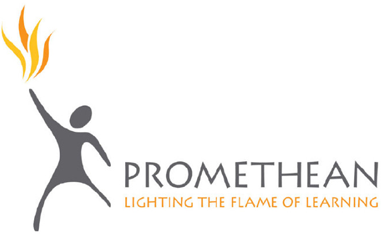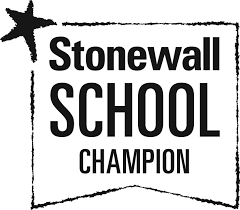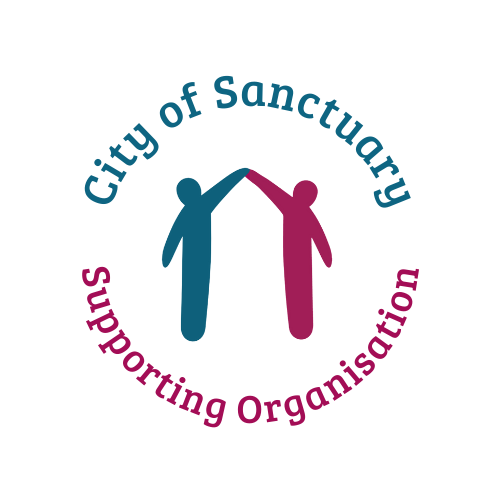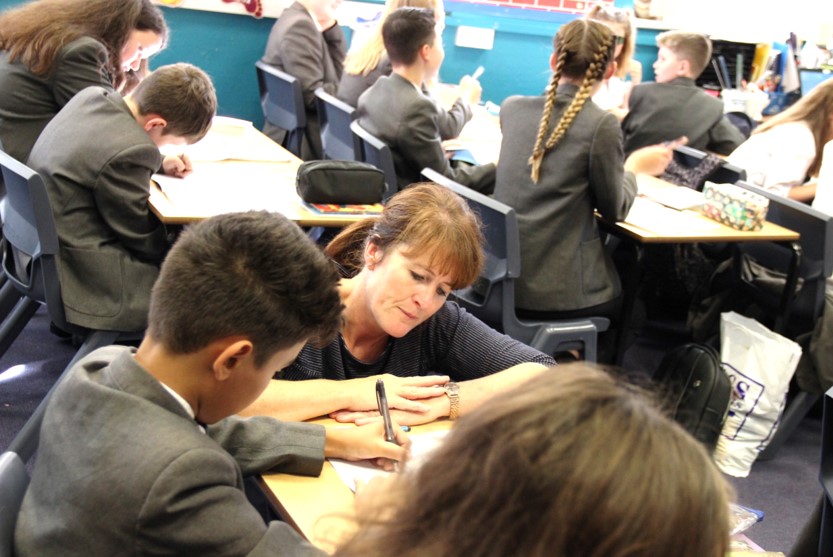
English:
Subject Information Overview
Below is a visual overview of the content available on this page. Click the appropriate title to view the relevant section
Curriculum
Area Staff Curriculum
InformationCurriculum
OverviewExam information for GCSE
qualifications in this Subject AreaKnowledge
Organisers
Curriculum Area Staff
|
Curriculum Director – Chris Wales (AAP)
Rowena Pickering (ACAL English)
Ed Kisby (Progress Leader, Year 9)
Deborah Leach
Nichola Mather
Nick Ogle (English Curriculum and Instructional Coach)
|
Isobel Sewell
Nicola Welsh (T&L: Literacy and SEN)
Kathryn Whitaker (Pastoral Director, Key Stage 3)
Joe Williams (Pastoral Director, Key Stage 4)
Ben Patchesa (CAL Media Studies/Literacy Leader)
|
Should you require more information about this subject area please contact:
Name: Mrs Rowena Pickering
Position: Curriculum Area Leader
Email: rp@selbyhigh.co.uk
Curriculum Information
English has a huge role to play in both your current education and your future life. Every career path and job you can think of is shaped by English and your ability to communicate effectively. Success in English will not only develop you within this subject, it will also act as a springboard for your success in every other area too. Your ability to be a critical reader, crafted writer and confident orator will give you the key skills to flourish in all aspects of school life. In addition, it naturally provides you with opportunities to develop your understanding of the world around you and key issues in the society we live in.
Beyond the range of texts you study, you’ll have the opportunity to develop your ability to explain, debate, persuade and challenge. You’ll consider the key themes that run through our lives as much now as they did in the times of Shakespeare or Dickens: relationships, conflict within the world, the importance of equality and tolerance, and of course your own identity. Ideas around love and death, friendship and family, respect and understanding – all of these will be integral to your understanding of the world in which we live.
In Year 7, you will have the opportunity to explore the theme of Identity and Experience. This will allow you to consider your own experiences through autobiographical and travel writing, whilst also considering a range of cultures and experiences through the novel Iqbal and a range of poetry. In the final term, you will then look at a timeline of literature to develop your knowledge of how texts (and people’s lives and experiences) have developed over time.
Year 8 then considers big ideas around ‘Justice and Oppression’. Themes of equality, injustice and prejudice are all considered through a range of different literary forms: the play Noughts and Crosses, Shakespeare’s Othello and the novel Animal Farm. Alongside this, you will have the opportunity to learn about real-life inspirational people who have challenged inequality and made a positive difference to the world by influencing change. In the summer term, you will focus on a range of Victorian literature, a time of huge social change.
In Year 9, you will study how literature considers ‘Power and Conflict’. Starting with Gothic literature, you have the opportunity to study a range of texts such as Dracula and Frankenstein, leading into the study of Macbeth. The reasons and consequences of conflict are then brought into the 20th century through a range of war poetry and short stories. As your knowledge and skills continue to develop towards GCSE study, the final term of Key Stage 3 then studies the musical Blood Brothers alongside a range of non-fiction texts.
At GCSE, you will take all the skills you have developed, along with the knowledge of how to study a range of literary forms and your understanding of a wide range of texts, and apply these across our key texts: Romeo and Juliet, An Inspector Calls, A Christmas Carol and a range of poetry from different time periods. You will also continue to develop your skills as a crafted writer in narrative and transactional forms, as a critical reader of both fictional and non-fictional texts, and as a crafted orator who is able to deliver and debate your own opinions on a number of key topics and societal issues.
Our curriculum is designed to allow you to reflect on and take pride in your own experiences whilst also preparing you for your future by broadening your knowledge of wider social and cultural contexts. We want you to continue a love of reading and a thirst for knowledge that you can take forward. Our aim is to equip you with the transferable skills and resilience that will enable you to be successful in your next steps. We want you to be able to adapt and excel in an ever-changing world, and our broad and balanced curriculum is designed to enable you to do just that.
Curriculum Overview
Below is a summary overview of the topics and their content that will be studied in each term by each year group. For more information about each topic, get your child to visit learning journeys and resources on the school online learning platform - Ready Steady Learn.
| Year Group |
Term 1 |
Term 2 |
Term 3 |
Term 4 |
Term 5 |
Term 6 |
7
|
Identity and experience |
|
Me, Myself and I
Reading
‘Know how to…’
Identify and understand the style and purpose of a text
Select references and quotations
Synthesise and summarise information
Analyse character and theme
Writing
‘Know how to…’
Use features of form: narrative and descriptive writing
Establish character, voice and setting in narrative writing
Use descriptive devices appropriate for form, audience and task.
Craft language choices and sentences for effect
Shape whole texts through effective planning.
Oracy
‘Know how to…’
Listen to and respond appropriately to questions and feedback
Express ideas using Standard English
Wider Links
Emotional wellbeing
British values and authors
Identity and self
|
Iqbal - characterisation
Reading
‘Know how to…’
Link text to context where appropriate
Select references and quotations
Synthesise and summarise information
Track plot, analyse character and theme
Explore symbolism and moral messages
Writing
‘Know how to…’
Write with critical style; write with accuracy and fluency
Track meanings across whole texts
Analyse impressions of character
Evaluate writer's language and structure choices
Select references and quotations
Use features of form: letters, newspaper articles
Oracy
‘Know how to…’
Listen to and respond appropriately to questions and feedback
Express ideas using Standard English
Read aloud to peers and teacher
Wider Links
Tolerance and morality
Wider cultures
Slavery and Bonded Labour
Emotional wellbeing
Diversity
Active citizenship and community values
Liberty and freedom of speech
|
Travel Writing
Reading
‘Know how to…’
Identify, understand and analyse the style and purpose of a text
Select references and quotations
Synthesise and summarise information
Link to context where appropriate
Access different forms of literature from a variety of writers
Identify and understand conventions of persuasive travel writing
Writing
‘Know how to…’
Write with critical style; write with accuracy and fluency
Track meanings across whole texts
Analyse viewpoints of the writer
Evaluate writer's language and structure choices
Select references and quotations
Oracy
‘Know how to…’
Listen to and respond appropriately to questions and feedback
Express ideas using Standard English
Wider Links
Geography and the wider world
British Values - Individual liberty and the freedom to express feelings, beliefs, value
Identity and diversity including women
Emotional wellbeing
Active citizenship and community values
|
Identity poetry
Reading
‘Know how to…’
Track meanings across whole texts
Select references and quotations
Synthesise and summarise information
Compare view points across poems
Make evaluative comments supported by the poem
Understand the use of figurative language and its effect
Writing
‘Know how to…’
Write with critical style; write with accuracy and fluency
Track meanings across whole texts
Analyse impressions of key ideas
Evaluate writer's language and structure choices
Select references and quotations
Use figurative language
Oracy
‘Know how to…’
Listen to and respond appropriately to questions and feedback
Express ideas using Standard English
Perform speeches in front of peers.
Wider Links
British values and British authors
Identity and diversity including women
Emotional wellbeing
Liberty and freedom of speech
Active citizenship and community values
|
Myths and Legends: Stories That Shaped Society. Timeline of Literature
Reading
‘Know how to…’
Link text to context where appropriate
Select references and quotations
Synthesise and summarise information
Track plot, analyse character and theme
Writing
‘Know how to…’
Use features of form: narrative and descriptive writing
Establish character, voice and setting in narrative writing
Use descriptive devices appropriate for form, audience and task.
Craft language choices and sentences for effect
Shape whole texts through effective planning
Oracy
‘Know how to…’
Listen to and respond appropriately to questions and feedback
Express ideas using Standard English
Read aloud to peers and teacher
Wider Links
Morality
Identity and diversity (cultures and genders)
Active citizenship
Wider cultural history and context.
|
An introduction to Shakespeare. Timeline of Literature
Reading
‘Know how to…’
Link text to context where appropriate
Select references and quotations
Synthesise and summarise information
Analyse character and theme
Understand and explain Shakespeare’s intentions
Writing
‘Know how to…’
Use features of form: narrative and descriptive writing
Establish character, voice and setting in narrative writing
Use descriptive devices appropriate for form, audience and task.
Write with critical style; write with accuracy and fluency
Track meanings across whole texts
Analyse impressions of character
Evaluate writer's language and structure choices
Select references and quotations
Oracy
‘Know how to…’
Listen to and respond appropriately to questions and feedback
Express ideas using Standard English
Wider Links
British Values and Culture: Shakespeare and theatrical performance
Active citizenship & community values
History - Jacobean era
|
| Assessment details |
Reading - Insight assessment
Writing - NMM - national baseline
In Class Assessment
End of unit milestone
|
In Class Assessment
End of unit milestone - NMM format
|
In Class Assessment
End of unit milestone - NMM format
Reading - Insight assessment
|
In Class Assessment
End of unit milestone - NMM format
|
In Class Assessment
End of unit milestone - NMM format
Writing NMM - national baseline
|
In Class Assessment
End of unit milestone - NMM format
Reading - Insight assessment
NMM - National baseline - writing
|
8
|
Justice and Equality
|
|
Crime and Punishment
Reading
‘Know how to…’
Synthesise and summarise information
Access challenging texts from a variety of authors
Identify and understand conventions of crime writing
Writing
‘Know how to…’
Use features of form: narrative and descriptive writing
Establish character, voice and setting in narrative writing
Use descriptive devices appropriate for form, audience and task.
Craft language choices and sentences for effect
Shape whole texts through effective planning
Oracy
‘Know how to…’
Listen to and respond appropriately to questions and feedback
Express ideas using Standard English
Wider Links
Geography and the wider world
British Values - Individual liberty and the freedom to express feelings, beliefs, values
|
Social injustice and the power of poetry: reading
Reading
‘Know how to…’
Access challenging texts from a variety of authors
Identify and understand conventions of poetry
Select references and quotations
Synthesise and summarise information
Writing
‘Know how to…’
- Write with critical style; write with accuracy and fluency
- Track meanings across whole texts
- Analyse key ideas
- Evaluate writer's language and structure choices
- Select references and quotations
Oracy
‘Know how to…’
Listen to and respond appropriately to questions and feedback
Express ideas using Standard English
Wider Links
British Values - Individual liberty and the freedom to express feelings, beliefs, values
Active citizenship & community values
Emotional Wellbeing
Identity and voice
|
Noughts and Crosses: transactional writing
Reading
‘Know how to…’
Identify and understand conventions of a playscript
Link text to context where appropriate
Select references and quotations
Synthesise and summarise information
Track plot, analyse character and theme
Writing
‘Know how to…’
- Use features of form: transactional writing
- Use rhetorical devices appropriate for form, audience and task.
- Craft language choices and sentences for effect
- Shape whole texts through effective planning
Oracy
‘Know how to…’
Listen to and respond appropriately to questions and feedback
Express ideas using Standard English
Wider Links
Emotional Wellbeing
Identity and voice
Active citizenship & community values
Diversity including women and other cultures
Morality
Racial segregation and diversity
|
Shakespeare: The Tempest
Reading
‘Know how to…’
Identify and understand conventions of the Jacobean era
Link text to context where appropriate
Identify and understand conventions of a playscript
Select references and quotations
Synthesise and summarise information
Writing
‘Know how to…’
- Write with critical style; write with accuracy and fluency
- Track meanings across whole texts
- Evaluate writer's language and structure choices
- Select references and quotations
- Follow the conventions of a playscript
Oracy
‘Know how to…’
Listen to and respond appropriately to questions and feedback
Express ideas using Standard English
Wider Links
Ancient history links
Identity and diversity including women and other cultures
Morality
|
Animal Farm: Reading - writing - oracy
Reading
‘Know how to…’
Identify and understand conventions of politically driven literature
Link text to context where appropriate
Select references and quotations
Synthesise and summarise information
Writing
‘Know how to…’
- Write with critical style; write with accuracy and fluency
- Track meanings across whole texts
- Analyse impressions of character
- Evaluate writer's language and structure choices
- Select references and quotations
Oracy
‘Know how to…’
Listen to and respond appropriately to questions and feedback
Express ideas using Standard English
Wider Links
British values and British authors
Identity including women and other cultures
Morality
Identity and voice
Active citizenship & community values
power and justice
|
Animal Farm: Reading - writing - oracy
Reading
‘Know how to…’
Identify and understand conventions of politically driven literature
Link text to context where appropriate
Select references and quotations
Synthesise and summarise information
Writing
‘Know how to…’
- Write with critical style; write with accuracy and fluency
- Track meanings across whole texts
- Analyse impressions of character
- Evaluate writer's language and structure choices
- Select references and quotations
Oracy
‘Know how to…’
Listen to and respond appropriately to questions and feedback
Express ideas using Standard English
Wider Links
British values and British authors
Identity including women and other cultures
Morality
Identity and voice
Active citizenship & community values
power and justice
|
| Assessment details |
In Class Assessment
End of Unit Milestone - NMM
Reading - Insight assessment
NMM - National baseline
|
In Class Assessment
End of Unit Milestone - NMM
|
In Class Assessment
End of Unit Milestone - NMM
|
In Class Assessment
End of Unit Milestone - NMM
Reading - Insight assessment
|
In Class Assessment
End of Unit Milestone - NMM
Oracy - speech
|
In Class Assessment
End of Unit Milestone - NMM
Oracy - speech
Reading - Insight assessment
NMM - National baseline - writing
|
9
|
Power and conflict
|
|
Gothic Literature
Reading
‘Know how to…’
Track plot, analyse character and theme
Identify and understand conventions of Gothic writing
Access challenging texts from a variety of authors and eras
Writing
‘Know how to…’
Use features of form: narrative and descriptive writing
Establish character, voice and setting in narrative writing
Use descriptive devices appropriate for form, audience and task.
Craft language choices and sentences for effect
Shape whole texts through effective planning
Develop an understanding of characterisation, tropes and writing styles.
Oracy
‘Know how to…’
Listen to and respond appropriately to questions and feedback
Express ideas using Standard English
Wider Links
British values and british authors
Identity and diversity including women
RSE themes explored
|
Macbeth
Reading
‘Know how to…’
Track plot, analyse character and theme
Understand and explain Shakespeare’s intentions
Annotate, track and plan for responses
Link text to context where appropriate
Select references and quotations
Synthesise and summarise information
Writing
‘Know how to…’
Write with critical style; write with accuracy and fluency
Use features of form: letters, newspaper articles
Oracy
‘Know how to…’
Listen to and respond appropriately to questions and feedback
Express ideas using Standard English
Wider Links
History - Jacobean era
Emotional wellbeing (Macbeth and Lady Macbeth)
Religion and the connection to monarchy
|
War Poetry
Reading
‘Know how to…’
Understand meaning of each poem; discuss poets’ use of form, structure and language; apply contextual knowledge to poems
Make comparisons between poems
Create effective annotations to facilitate learning
Select references and quotations
Writing
‘Know how to…’
Write with critical style; write with accuracy and fluency
Use features of form: letters, diary entries, articles
Use features of form: transactional writing
Establish character, voice and setting in narrative writing
Use descriptive devices appropriate for form, audience and task.
Craft language choices and sentences for effect
Oracy
‘Know how to…’
Listen to and respond appropriately to questions and feedback
Express ideas using Standard English
Read poetry with a consideration for pace, tone and meaning
Wider Links
WW1 poetry links to British Values
Identity and diversity including women and LGBTQ+ community
Direct links to history study (WW1)
|
Short Stories
Reading
‘Know how to…’
Track meanings across whole texts
Select references and quotations
Synthesise and summarise information
Compare view points across texts
Make evaluative comments supported by the text
language analysis
Writing
‘Know how to…’
Use features of form: transactional writing in line with GCSE specification
Establish tone, purpose and formality
Write with accuracy and fluency
Consider the structuring of a text to make it purposeful and impactful
Craft language choices and sentences for effect
Oracy
‘Know how to…’
Listen to and respond appropriately to questions and feedback
Express ideas using Standard English
Wider Links
Identity and diversity
Tolerance and morality
Global, national and local issues
|
Blood Brothers
Reading
‘Know how to…’
Track plot, analyse character and theme
Understand and explain Russel's intentions
Annotate, track and plan for responses
Link text to context where appropriate
Select references and quotations
Understand conventions of a playscript
Writing
‘Know how to…’
Write with critical style; write with accuracy and fluency
Use features of form: letters, newspaper articles
Use descriptive devices appropriate for form, audience and task
Craft language choices and sentences for effect
Use features of form: descriptive writing, playscript
Oracy
‘Know how to…’
Listen to and respond appropriately to questions and feedback
Express ideas using Standard English
Wider Links
Tolerance (class, capitalism, socialism, family)
Identity and diversity
Historical context of class and society
RSE Themes explored
|
| Assessment details |
NMM - National baseline - writing
In Class Assessment
End of Unit Milestone - Writing - NMM
|
In Class Assessment
End of Unit Milestone - NMM
|
In Class Assessment
End of Unit Milestone - NMM
|
In Class Assessment
End of Unit Milestone - NMM
|
NMM - National baseline - writing
In Class Assessment
End of Unit Milestone - NMM
|
10
|
A Christmas Carol
Reading
‘Know how to…’
Track plot, analyse character and theme
Understand and explain Priestley’s intentions
Annotate, track and plan for responses
Link text to context where appropriate
Writing
‘Know how to…’
Write with critical style; write with accuracy and fluency"
"Oracy
‘Know how to…’
Listen to and respond appropriately to questions and feedback
Express ideas using Standard English
Plan speech effectively for audience and purpose
Present ideas effectively for class debate
Wider Links
British Values - mutual respect and tolerance; friendships; family relationships
Identity, equality and diversity explored
Active citizenship & community values
|
Language C1 and Narrative writing
Reading
‘Know how to…’
Track meanings across whole texts
Analyse impressions of character
Evaluate writer's language and structure choices
Select references and quotations
Synthesise and summarise information
Writing
‘Know how to…’
Use features of form: narrative and descriptive writing
Establish character, voice and setting in narrative writing
Use descriptive devices appropriate for form, audience and task.
Craft language choices and sentences for effect
Shape whole texts through effective planning
Oracy
‘Know how to…’
Listen to and respond appropriately to questions and feedback
Express ideas using Standard English
Wider Links
British Values - Individual liberty and the freedom to express feelings, beliefs, values
|
Poetry War Cluster; C2 Language and Transactional Writing
Reading
‘Know how to…’
Understand meaning of each poem; discuss poets’ use of form, structure and language; apply contextual knowledge to poems
Make comparisons between poems
Create effective annotations to facilitate learning
Track whole texts
Develop and consolidate comment/evidence
Writing
‘Know how to…’
Write with critical style; write with accuracy and fluency
Use features of form: transactional writing - letters and speeches, review, article
Use rhetorical devices appropriate for form, audience and task.
Craft language choices and sentences for effect
Shape whole texts through effective planning
Oracy
‘Know how to…’
Listen to and respond appropriately to questions and feedback
Express ideas using Standard English
Wider Links
WW1 poetry links to British Values
Identity and diversity including women
Direct links to history study (WW1)
|
Poetry Cluster 2 & 3
Reading
‘Know how to…’
Understand meaning of each poem; discuss poets’ use of form, structure and language; apply contextual knowledge to poems
Make comparisons between poems
Writing
‘Know how to…’
Write with critical style; write with accuracy and fluency"
"Oracy
‘Know how to…’
Listen to and respond appropriately to questions and feedback
Express ideas using Standard English
Wider Links
RSE themes explored through poem choice
Identity, equality and diversity explored
|
An Inspector Calls and Spoken Language (C3)
Reading
‘Know how to…’
Track plot, analyse character and theme
Understand and explain Priestley’s intentions
Annotate, track and plan for responses
Link text to context where appropriate
Writing
‘Know how to…’
Write with critical style; write with accuracy and fluency
Transational writing - rhetorical devices, speech writing
Oracy
‘Know how to…’
Listen to and respond appropriately to questions and feedback
Express ideas using Standard English
Present ideas effectively for class debate
Wider Links
British Values - respect for the law; responsibility
RSE themes explored
Active citizenship & community values
History - Edwardian era
|
An Inspector Calls & C1 Trial
Reading
‘Know how to…’
Track plot, analyse character and theme
Understand and explain Shakespeare’s intentions
Annotate, track and plan for responses
Link text to context where appropriate
Track meanings across whole texts
Analyse impressions of character
Evaluate writer's language and structure choices
Select references and quotations
Synthesise and summarise information
Writing
‘Know how to…’
Write with critical style; write with accuracy and fluency
Use features of form: narrative and descriptive writing
Establish character, voice and setting in narrative writing
Use descriptive devices appropriate for form, audience and task.
Craft language choices and sentences for effect
Shape whole texts through effective planning
Oracy
‘Know how to…’
Listen to and respond appropriately to questions and feedback
Express ideas using Standard English
Wider Links
British Values - respect for the law; responsibility
RSE themes explored
Active citizenship & community values
History - Edwardian era
|
| Assessment details |
Assessment
ACC end of unit exam response (in class)
|
Assessment
In class C1 assessment
|
Assessment
In class assessment - C2 Language
Poetry Comparison exam response
|
Assessment
Poetry exam response
|
Assessment
End of unit AIC exam response (in class)
Spoken Language presentation
|
Assessment
Internal mock exams
English Language C1 mock
End of unit AIC (in class)
|
11
|
Romeo and Juliet
Reading
‘Know how to…’
Track plot, analyse character and theme
Understand and explain Shakespeare’s intentions
Annotate, track and plan for responses
Link text to context where appropriate
Writing
‘Know how to…’
Write with critical style; write with accuracy and fluency
Oracy
‘Know how to…’
Listen to and respond appropriately to questions and feedback
Express ideas using Standard English
Organise information and ideas effectively for an informative presentation
Plan speech effectively for audience and purpose
Wider Links
British Values - Democracy and the role of the government (the Prince); age of consent
RSE themes explored
Active citizenship & community values
History - Jacobean era
|
English Language C2 And Poetry Cluster 4
Reading
‘Know how to…’
Track meanings across whole texts
Select references and quotations
Synthesise and summarise information
Compare view points across texts
Make evaluative comments supported by the text
Writing
‘Know how to…’
Use features of form: review, article, report
Use rhetorical devices appropriate for form, audience and task.
Craft language choices and sentences for effect
Shape whole texts through effective planning
Oracy
‘Know how to…’
Listen to and respond appropriately to questions and feedback
Express ideas using Standard English
Plan speech effectively for audience and purpose
Organise ideas persuasively for a speech
Wider Links
British Values - Individual liberty and the freedom to express feelings, beliefs, values
|
English Language C1 and C2 Revisits and C1 and C2 Literature revisits
Reading
‘Know how to…’
Track meanings across whole texts
Analyse impressions of character
Evaluate writer's language and structure choices
Select references and quotations
Synthesise and summarise information
Compare view points across texts
Make evaluative comments supported by the text
Writing
‘Know how to…’
Use features of form: narrative and descriptive writing
Establish character, voice and setting in narrative writing
Use descriptive devices appropriate for form, audience and task.
Craft language choices and sentences for effect
Shape whole texts through effective planning
Use features of form: review, article, report, speech, letter
Use rhetorical devices appropriate for form, audience and task.
Oracy
‘Know how to…’
Listen to and respond appropriately to questions and feedback
Express ideas using Standard English
Wider Links
British Values - Individual liberty and the freedom to express feelings, beliefs, values
|
TBC in accordance with necessary run in to exams.
Reading
‘Know how to…’
Revision of analysis, CED, retrival, inference, evaluation, comparison
Writing
‘Know how to…’
Revison of narrative writng, transactional writng, analytical writing (CED)
Oracy
‘Know how to…’
Spoken langauge and listen to and respond appropriately to questions and feedback
Express ideas using Standard English
|
|
| Assessment details |
Assessment
Mocks - C1 Literature paper
|
Assessment
Internal mock exams
C2 Language mock exam and C1 Literature mock
|
Assessment
Internal mock exams
C2 Literature and C1 Language
|
Assessment
Final Exams
|
|
KNOWLEDGE ORGANISERS
A Knowledge Rich Curriculum at Selby High School
Research around memory suggests that if knowledge is studied once and not revisited or revised, it is not stored in the long-term memory. This means that after one lesson, or revising for one test, the knowledge will not be retained unless it is studied again. It won’t be recalled unless it is revisited frequently, which will embed it in the long term memory. In the long term this makes recall far easier. As part of home learning, students should be revising what they have been taught recently but also content they were taught previously. Therefore as part of our strategy to embed learning over time we have started to develop knowledge organisers across all year groups and curriculum areas. These will provide key content and knowledge allowing students to pre-learn and re-learn, a vital part of processing all the information required to be successful in the new style GCSE’s.
Instructions for using your knowledge organisers
KS3 = Years 7, 8 & 9
KS4 = Years 10 & 11
Below are the knowledge organisers for each topic in this subject. These knowledge organisers will become embedded in the Learning Journeys for each topic as they are created on Ready Steady Learn.
Exam information for GSCE qualifications in this subject area
Click each link below to view the full specification:
Exam board: Eduqas
English Language
C1 - 20th Century Literature Reading and Creative Prose
C2 - 19th and 21st Century Non-Fiction Reading and Transactional Writing
C3 - Spoken Language.
English Literature
C1 - Shakespeare & Poetry Anthology
C2 - Post 1914 Prose/Drama & 19th Century Prose & Unseen Poetry



